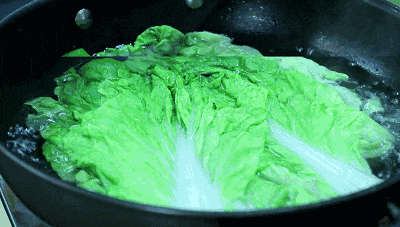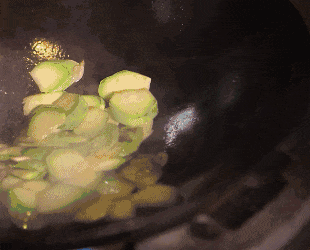These dishes are listed in the "carcinogenic list" and can’t be eaten any more? What really causes cancer is it.
Original Tencent medical code
Eating more vegetables has always been a consistent recommendation for health and wellness.
However, from time to time, you may hear such a discussion-
"So-and-so food can’t eat! Online, it is said that this dish will cause cancer if eaten! "
"Impossible, these are all rumors. How can vegetables cause cancer?"

(Source: Network)
Seeing the tweet that "vegetables may cause cancer" in the family group, many people began to wonder if green and healthy vegetables would also hide "mines". What the hell is going on here?

This vegetable is really "possibly carcinogenic"!
As a common "mountain dish" in many areas, bracken has the title of "king of wild vegetables". Its taste is crisp and tender, and its fragrance is strong, so many people can’t help eating two more in spring.

(Source: Wikimedia Commons)
However, Pteridium aquilinum is the only vegetable with cancer-causing ability so far!
As early as 2011, Pteridium aquilinum was listed as a Class 2B carcinogen by the World Health Organization, that is, it is carcinogenic to animals and possibly to humans, but the possibility of carcinogenesis is low [1].
* Note: Pickled vegetables are also Class 2B carcinogens, but mainly because of the processing method, not the vegetables themselves.
It is found that a compound called protopterin in Pteridium aquilinum is the "culprit" that may cause cancer.

In animal experiments, feeding bracken to mice and other experimental animals may cause them to develop intestinal tumors or bladder tumors. However, there is still insufficient evidence to prove that bracken can cause cancer, so it belongs to "substances that may cause cancer in human beings" [2].
So, can’t bracken really be eaten in one bite?
In theory, there is no absolute safe dose for foods that may cause cancer, which means that no matter how much you eat, there is a cancer risk. Therefore, if you don’t eat it, you can avoid the risk of cancer. Why not?
But if you really want to eat it, there is a simple way to help you reduce the risk without eating too much bracken products.
That is, drowning!

(source: soogif)
You can boil the tender fern leaves for 15 minutes after the water is boiled, or steam the tender fern leaves for 10 ~ 12 minutes, then discard the water in the cooked tender fern leaves and cook them. This can effectively reduce protopterin and other water-soluble toxic compounds in tender fern leaves [2].
2. Broken ear root (Houttuynia cordata Thunb.) causes cancer: Don’t worry too much!
The root of auricularia auricula, that is, houttuynia cordata, is also a frequent visitor in the "cancer list" of the family group.
A popular saying is: "Houttuynia cordata contains the poison aristolochic acid, which can cause cancer if eaten!"

(Source: Network)
Let’s answer directly: basically don’t worry! There is no aristolochic acid in Houttuynia cordata Thunb, but some are aristolochic lactams.
The rumored aristolochic acid is indeed a well-known class 1 carcinogen, that is, a clear carcinogen, and aristolochic acid has a strong carcinogenic effect. A small amount of aristolochic acid may cause DNA damage, which in turn may lead to various cancers such as kidney cancer.
However, houttuynia cordata contains not aristolochic acid, but aristolochic lactam.
Aristolochiam is a general term for a large class of compounds, and five kinds of Aristolochiam contained in Houttuynia cordata Thunb are not toxic [3]. At present, only in vitro cell experiments have found that Houttuynia cordata extract contains toxic substances and has hepatocyte toxicity [4].

Generally speaking, the evidence that Houttuynia cordata Thunb is toxic is very limited. So, basically don’t worry, it’s ok to eat something to relieve your craving in the season. Houttuynia cordata Thunb. has always been a frequent visitor to the table of the people in the three southwestern provinces!
3. Cucumber vegetables such as zucchini and bergamot can cause cancer?
Dian Dian said that it is necessary to avenge the rumored pumpkin, fingered citron and other melon vegetables!
Rumor has it that frying these melons and vegetables will produce acrylamide, a class 2A carcinogen (which may cause cancer to the human body and has a high possibility of cancer).

(source: soogif)
In fact, as long as foods containing carbohydrates and amino acids, such as potatoes, bread, coffee, etc., are cooked at a high temperature above 120℃, it is easy to have a "Maillard reaction".
This reaction can make food yellow and brown, release attractive aroma, but also produce acrylamide.
Therefore, the key point is that the main reason for acrylamide production in melon vegetables is "stir-frying", that is, high-temperature cooking! It is a bit unfair to let squash and other melon vegetables "carry the pot".

After all, acrylamide is more common in fried, baked and puffed foods. To avoid risks, we should eat less of these foods, and at the same time, when cooking, we should pay attention to the temperature, try to choose steaming, boiling and stir-frying, and seldom use high-temperature cooking methods such as frying and frying.
4. Cucumber "flowering" will cause cancer: don’t worry!
It is rumored that the cucumbers with thorns in the top flowers are all hormonal, which will not only cause precocious puberty, but also cause cancer.
In fact, the truth is that the top flowering cucumber may be the result of natural growth, or it may be that the plant hormone chlorfenuron was used when the cucumber bloomed.

Both of them are safe! Cucumber picked early is easy to blossom at the top, but as a plant hormone, chlorfenuron is only useful for plants, has no effect on animals, and will not cause toxicity and cancer to human body. Moreover, the general dosage is very small. If excessive hormones are used, cucumbers are prone to bitterness, hollowness, deformity and even decay.

Everyone has learned a lot about the rumors that vegetables are carcinogenic, but do you know that many vegetables are not carcinogenic but bring their own "toxins"?
However, don’t worry, you can "detoxify" with one move!

1. Fresh day lily: It contains a substance called "colchicine", which is strongly irritating to the gastrointestinal tract and can lead to symptoms such as nausea, vomiting and diarrhea. However, colchicine is easily soluble in water and not resistant to high temperature. After blanching and drying in the sun, the toxin can be basically removed.
2. Beans: It contains a lot of saponins, labyrinthine, hemagglutinin and protease inhibitors. If it is not cooked, it is harmful to human body, which can destroy red blood cells and cause irritation to gastrointestinal mucosa!
It needs to be boiled for more than 15 minutes, so that the beans are fully cooked, lose their original bright green color, and taste tasteless and bitter, and the toxin can be destroyed [5].
3. Spinach, amaranth, bitter gourd and other vegetables with bitter taste: These vegetables taste a little astringent and have a high oxalic acid content. Eating in large quantities will stimulate gastrointestinal mucosa, and oxalic acid can also combine with calcium to form insoluble "calcium oxalate precipitate", which will affect the absorption of calcium by human body or form urinary calculi. Eat properly, or blanch before cooking, and you can rest assured!

Having said so many rumors about vegetables, I believe everyone already knows that most vegetables are still green and healthy representatives. As long as they are done properly, they are all good choices at our table!
But in fact, there may be "carcinogenic poisons" hidden on our dining table!

The following four kinds of food, we really need to be vigilant, don’t eat less:
1. Processed meat:
Refers to the meat that has been smoked, salted, air-dried or other flavors that are conducive to preservation, such as dried meat, ham, bacon, etc. At present, processed meat has been "honored" as a class 1 carcinogen!
2. Chinese salted fish:
When making, it is salted and then air-dried, and a large number of nitroso compounds will be generated in the process, which belongs to Class 2A carcinogens! At present, there is sufficient evidence to suggest that Chinese salted fish will increase the risk of nasopharyngeal carcinoma.

3. Betel nut:
Recognized as a class 1 carcinogen, it is also addictive! Chewing betel nut often will damage oral mucosa and cause abnormal cell proliferation. In addition, betel nut contains a variety of alkaloids, which will promote the death of epithelial cells and greatly increase the risk of oral cancer! [6]
4. Alcohol:
Needless to say, a proper class 1 carcinogen. There is no safe intake of alcohol. A large-scale study in The Lancet shows that any amount of alcohol will be harmful to health [7]!
Therefore, as long as we eat correctly, most vegetables are healthy, and eating more vegetables in moderation is beneficial to our health. As for "carcinogenic food", we should try to eat as little as possible and keep our mouths shut.
Audit expert: Zuo Xiaoxia
Director of Nutrition Department, Eighth Medical Center, PLA General Hospital
references
1.https://inchem.org/documents/iarc/vol40/brackenfern.html
2. Center for Food Safety (HK): https://www.cfs.gov.hk/tc _ chi/Programme/Programme _ RAFs/Programme _ RAFs _ FCI _ 02 _ 04.html.
3. Yin Mingxing, et al. "Discussion on the safety of Houttuynia cordata Thunb. from Aristolochia lactam." Chinese herbal medicine 52.19 (2021): 6045-6051.
4. Gao Bin, Li Guifeng, Sun Qiaosheng, Ma Yanhong, Liu Wenhua. Hepatotoxicity and chemical constituents of Houttuynia cordata Thunb [J]. China Science and Technology of Traditional Chinese Medicine, 2021,28(04):564-567.
5. Zhang Wei, Bai Jinping, Mao Xuemei, Wang Lixia, Li Xiaohuan, Huang Weimeng, Jin Yan. Two cases of physostigmine poisoning caused by eating green beans and literature review [J]. Gansu Science and Technology, 2020 (05): 111-112.
6.World Health Organization and International Agency for Research on Cancer (IARC), Betel-Quid and Areca-Nut Chewing and Some Areca-Nut-Derived Nitrosamines, vol. 85 of IARC Monographs on the Evaluation of Carcinogenic Risks to Humans, 2004.
7.Burton R, Sheron N. No level of alcohol consumption improves health. Lancet. 2018; 392(10152):987-988.
* Produced by Tencent Medical Content Team
Read the original text